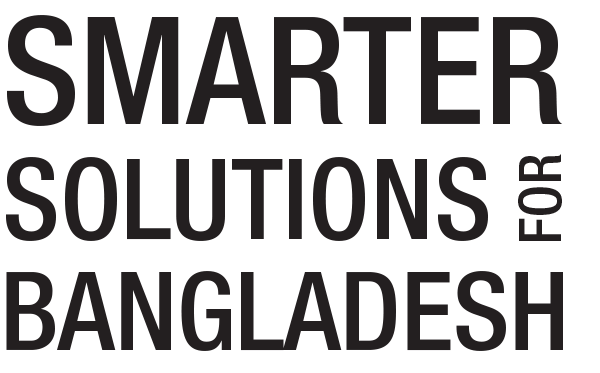Bangladesh Nutrition - Research
Nutrition Direct Package: Costs and Benefits of Providing Nutrition Supplements to Pregnant Mothers and Children to Reduce Stunting in Bangladesh.
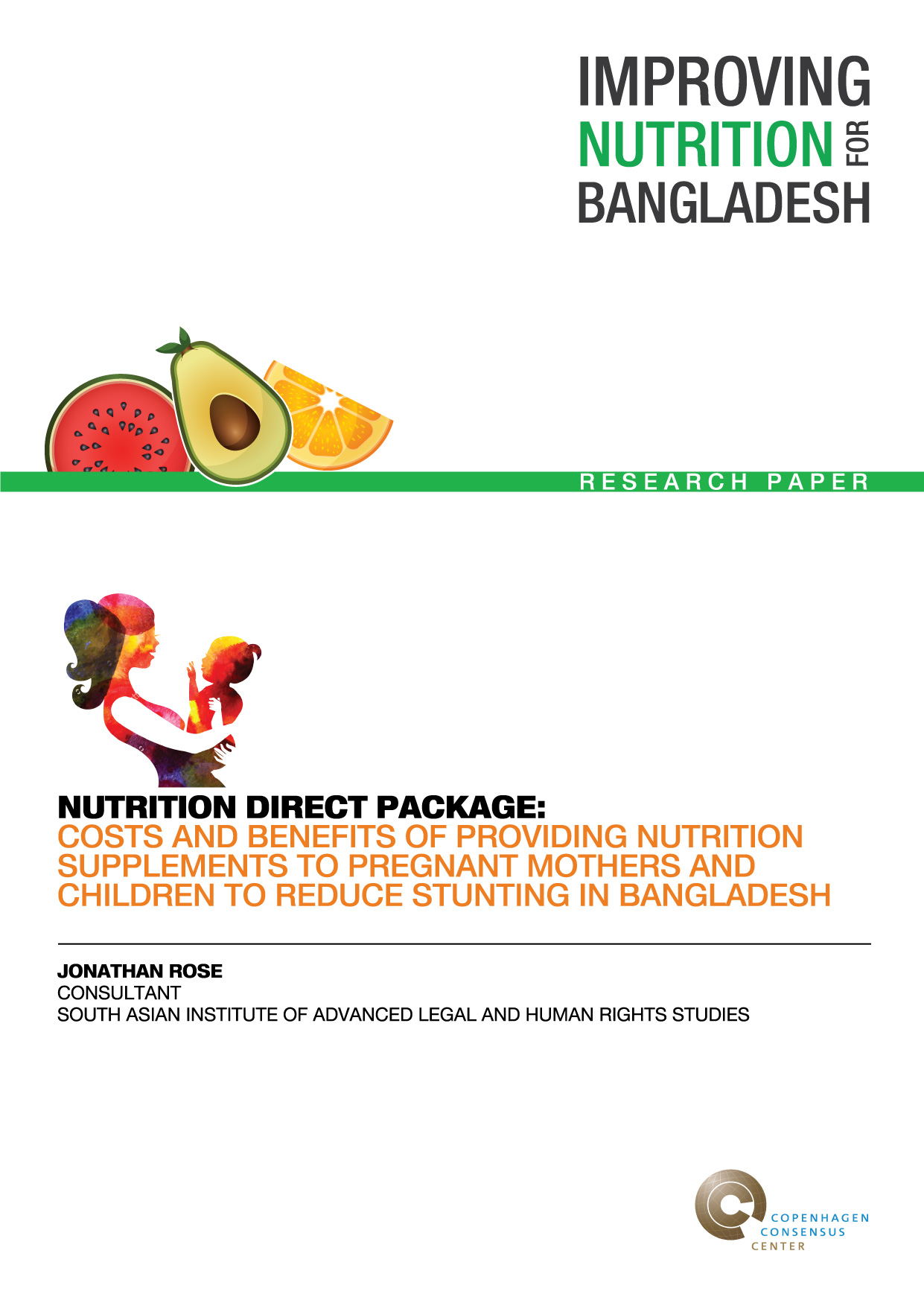 Research by Jon Rose suggests that direct nutritional interventions aimed at mothers, babies and small children in the first 1,000 days would yield improvements in physical and cognitive development. This would result in better educational achievements for children as they grow up as well as better health, and increased earnings later, upon entering the labor market. Rose’s analysis indicates that every Taka spent would generate a return to society of 18.8 Taka.
Research by Jon Rose suggests that direct nutritional interventions aimed at mothers, babies and small children in the first 1,000 days would yield improvements in physical and cognitive development. This would result in better educational achievements for children as they grow up as well as better health, and increased earnings later, upon entering the labor market. Rose’s analysis indicates that every Taka spent would generate a return to society of 18.8 Taka.
Download the full academic paper here.
Complementary Feeding Promotion: Costs and Benefits of Promoting Complementary and Supplementary Feeding among Women and Children from the Societal Perspective.
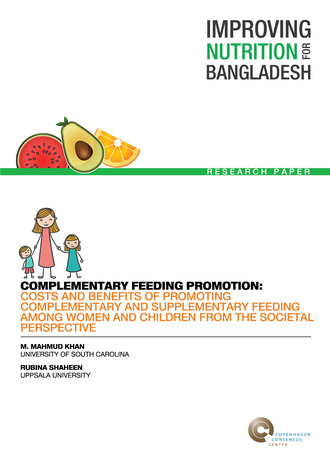 Research by Mahmud Khan and Rubina Shaheen offer an analysis on the costs and benefits of promoting nutritious foods that can be eaten alongside rice. The promotion of supplementary and complementary foods would help address poor nutrition among children, pregnant women and mothers which has led to long-term health problems, poor cognitive development, as well as reduced earnings for children. Khan and Shaheen’s analysis indicates that every Taka spent would generate a return to society of 14.5 Taka.
Research by Mahmud Khan and Rubina Shaheen offer an analysis on the costs and benefits of promoting nutritious foods that can be eaten alongside rice. The promotion of supplementary and complementary foods would help address poor nutrition among children, pregnant women and mothers which has led to long-term health problems, poor cognitive development, as well as reduced earnings for children. Khan and Shaheen’s analysis indicates that every Taka spent would generate a return to society of 14.5 Taka.
Download the full academic paper here.
Tobacco Cessation: Costs and Benefits of Smokeless Tobacco Cessation during Pregnancy in Bangladesh.
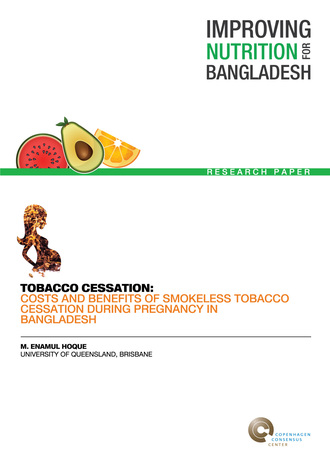 Research by Enamul Hoque focuses on the costs and benefits of smokeless tobacco cessation among pregnant women in Bangladesh. Bangladesh has the highest prevalence of Smokeless Tobacco (SLT) among women in the world and perceptions of health benefits resulting from SLT use are widespread. Hoque’s solution is the introduction of a behavioral intervention that would educate women on the adverse health and pregnancy outcomes associated with SLT consumption. The study suggests that every Taka spent would generate a return to society of 7 Taka.
Research by Enamul Hoque focuses on the costs and benefits of smokeless tobacco cessation among pregnant women in Bangladesh. Bangladesh has the highest prevalence of Smokeless Tobacco (SLT) among women in the world and perceptions of health benefits resulting from SLT use are widespread. Hoque’s solution is the introduction of a behavioral intervention that would educate women on the adverse health and pregnancy outcomes associated with SLT consumption. The study suggests that every Taka spent would generate a return to society of 7 Taka.
Download the full academic paper here.
Pregnancy Supplements: Costs and Benefits of Providing Three Nutritional Supplements for Pregnant Women in Bangladesh.
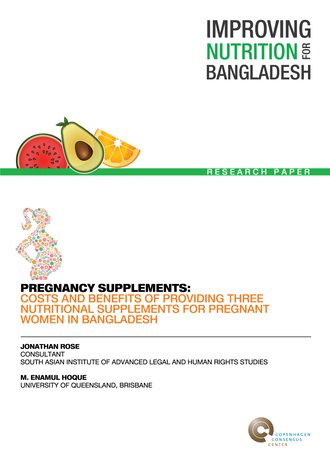 Research by Jon Rose and Enamul Hoque focuses on three key nutrition direct interventions during pregnancy – calcium supplementation, balanced energy protein supplementation and iron-folate supplementation. Calcium supplementation reduces the chance of pre-eclampsia during birth, a pregnancy complication characterized by high blood pressure that can cause maternal mortality and pre-term birth. Balanced energy-protein decreases the incidence of a stillbirth and decreases the risk of small for gestational age infants. Lastly, Iron-folate supplementation has been shown to reduce the risk of anemia in mothers by 69 percent. The analysis of each of these interventions shows substantial economic benefits relative to the costs, with every Taka spent generating a return to society of between 12 and 28 Taka (benefit cost ratio for iron-folate supplements is 27.5, for balanced energy protein is 16.7, and for calcium is 12).
Research by Jon Rose and Enamul Hoque focuses on three key nutrition direct interventions during pregnancy – calcium supplementation, balanced energy protein supplementation and iron-folate supplementation. Calcium supplementation reduces the chance of pre-eclampsia during birth, a pregnancy complication characterized by high blood pressure that can cause maternal mortality and pre-term birth. Balanced energy-protein decreases the incidence of a stillbirth and decreases the risk of small for gestational age infants. Lastly, Iron-folate supplementation has been shown to reduce the risk of anemia in mothers by 69 percent. The analysis of each of these interventions shows substantial economic benefits relative to the costs, with every Taka spent generating a return to society of between 12 and 28 Taka (benefit cost ratio for iron-folate supplements is 27.5, for balanced energy protein is 16.7, and for calcium is 12).
Download the full academic paper here.
Home Livestock: Costs and Benefits of Enhancing Rural Diets by Improving Homestead Food Production of Animal Source Foods.
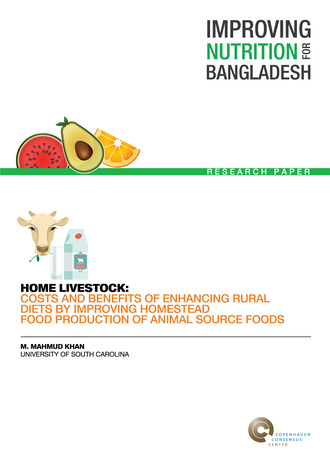 Research by Mahmud Khan offers an analysis on the costs and benefits of increasing homestead production of animal-source-foods as a means to increase household income and subsequent nutritional status. Khan identifies an increase in household income as the main benefit of raising livestock. An increase in income would reduce the stunting of children and increase their potential earnings when they grow up and enter the labor market. Rural diets would also improve as a result of increased livestock production. According to Khan’s analysis, each Taka spent would generate a result to society of 3 Taka.
Research by Mahmud Khan offers an analysis on the costs and benefits of increasing homestead production of animal-source-foods as a means to increase household income and subsequent nutritional status. Khan identifies an increase in household income as the main benefit of raising livestock. An increase in income would reduce the stunting of children and increase their potential earnings when they grow up and enter the labor market. Rural diets would also improve as a result of increased livestock production. According to Khan’s analysis, each Taka spent would generate a result to society of 3 Taka.
Download the full academic paper here.
Girls Secondary Schooling Costs and Benefits of Providing Girls with Greater Educational Opportunities – Child Nutrition and Labor Market Outcomes.
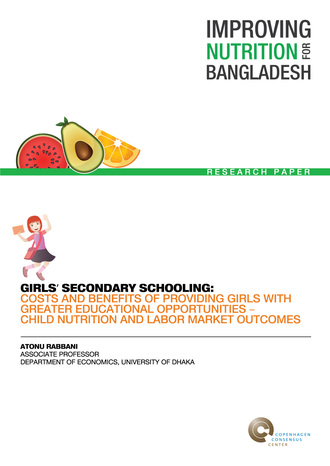 Research by Atonu Rabbani looks at how providing stipends to girls could help encourage them to stay in school and receive a secondary education. Rabbani’s analysis shows a strong correlation in Bangladesh between early marriage among girls and dropping out of school. The research suggests that girls who stay in school, have the potential to reduce the age of starting a family and will help to educate future mothers. Better educated girls should also result in an increase in the potential earnings of women and mothers. According to Rabbani’s analysis, every Taka spent would generate a return to society of 12.6 Taka.
Research by Atonu Rabbani looks at how providing stipends to girls could help encourage them to stay in school and receive a secondary education. Rabbani’s analysis shows a strong correlation in Bangladesh between early marriage among girls and dropping out of school. The research suggests that girls who stay in school, have the potential to reduce the age of starting a family and will help to educate future mothers. Better educated girls should also result in an increase in the potential earnings of women and mothers. According to Rabbani’s analysis, every Taka spent would generate a return to society of 12.6 Taka.
Download the full academic paper here.
Girls’ Secondary Schooling: Costs and Benefits of Education as a Solution to Child Malnutrition.
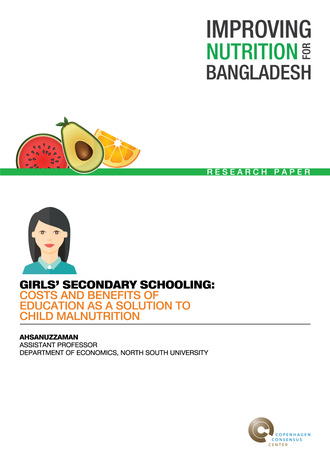 Research by Ahsanuzzaman evaluates the costs and benefits of girl’s secondary schooling as a means to mitigate child malnutrition. The analysis indicates that children whose mothers have completed secondary school are less likely to be stunted and underweight than those children whose mothers are illiterate. Consequently, a child’s nutritional status is improved through a mother’s education and subsequent knowledge on nutrition and health. Ahsanuzzaman’s analysis indicates that every Taka spent would generate a return to society of 6.4 Taka.
Research by Ahsanuzzaman evaluates the costs and benefits of girl’s secondary schooling as a means to mitigate child malnutrition. The analysis indicates that children whose mothers have completed secondary school are less likely to be stunted and underweight than those children whose mothers are illiterate. Consequently, a child’s nutritional status is improved through a mother’s education and subsequent knowledge on nutrition and health. Ahsanuzzaman’s analysis indicates that every Taka spent would generate a return to society of 6.4 Taka.
Download the full academic paper here.

